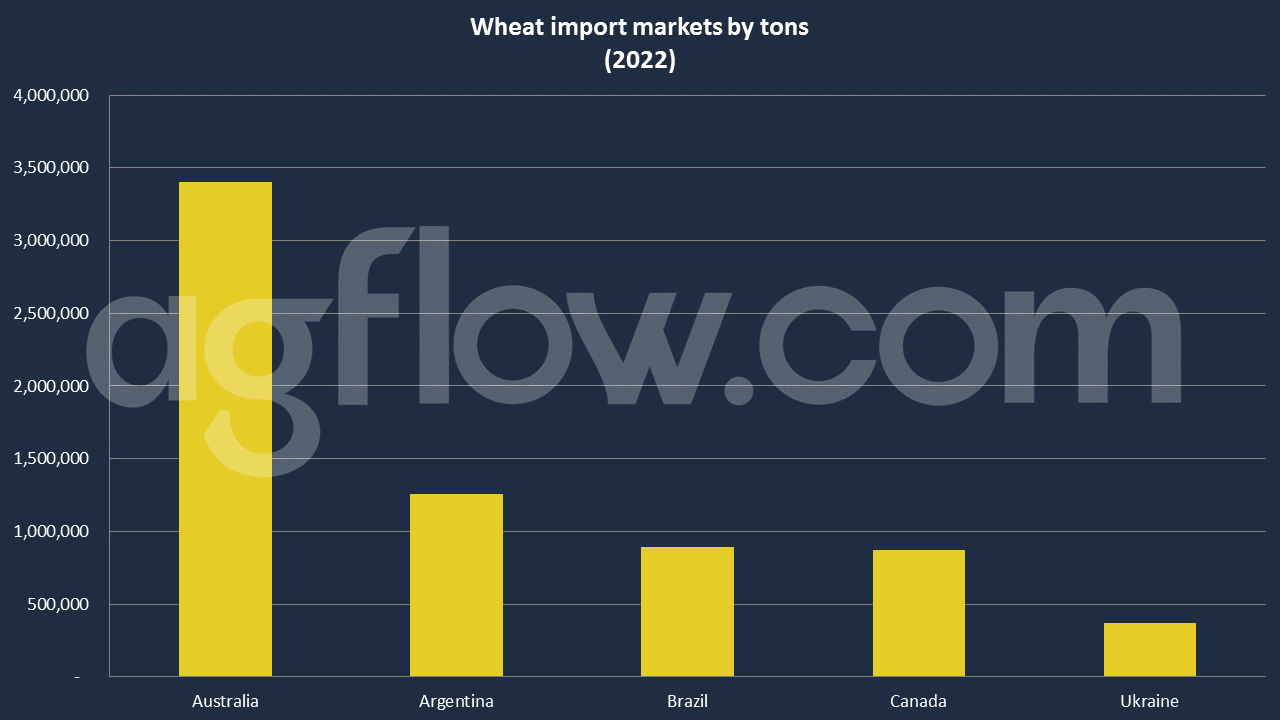Can Sorghum Replace Wheat in Indonesia?
Reading time: 2 minutes
According to the Indonesian Flour Mills Association, a week after the war broke out, there were 60 containers ready for shipment to Indonesia, each loading around 20 tons of Wheat stuck in Ukraine. As a result, Indonesia relies on Wheat imports from Australia and Argentina. Wheat imports from the two countries accounted for 64.1 percent of Indonesia’s total Wheat imports.
Indonesia’s Wheat imports in 2021 were at 11.43 million tons, an increase of 8.85% from 2020, according to data from the Central Statistics Agency. As for this year, until the end of June, Wheat imports have reached 5.5 million tons. Domestic Wheat stocks are in the spotlight after being said to be the leading cause of the potential increase in the price of instant noodles, which is suspected to be threefold. It’s transparent Indonesia still depends on the supply of Wheat imports from the five largest producing countries.
Indonesia’s Wheat imports reached 4.35 million tons with a value of USD 1.6 billion in January-May 2022. The most significant import of Wheat came from Australia, which reached 1.57 million tons with a value of USD 585.6 million. The volume of Indonesian Wheat imports from Australia reached 36% of the total imports. The second largest supplier is Argentina, with a volume of 1.4 million tons valued at USD497.2 million, followed by Canada, with a volume reaching 572.6 thousand tons valued at USD276.1 million. As per Agflow data, Australia led their import market with 3.4 million tons in 2022, followed by Argentina (1.2 million tons), Brazil (0.9 million tons), and Canada (0.87 million tons).

Indonesian Wheat Substitute Initiative
To solve Indonesia’s dependence on Wheat imports, the Government is developing Sorghum, expecting it could substitute Wheat as the main ingredient of instant noodles and other essential food products. In July, President Joko Widodo instructed his Cabinet to develop Sorghum as a substitute for Wheat. The policy decision was taken to achieve food security amid the Wheat shipment disruption.
This year, Sorghum area was 15,000 hectares across West Nusa Tenggara, East Nusa Tenggara, West Java, East Java, and Lampung. Then, the Government aims to open another 115,000 ha of land for Sorghum cultivation in 2023 and 154,000 ha more in 2024.The pilot project for Sorghum cultivation is currently being carried out in Waingapu, East Nusa Tenggara. Sorghum production is estimated to reach 3-4 tons per ha in the area. Meanwhile, in Java, the productivity is estimated to get 4-5 tons per ha. With the Sorghum development, the Government expects to reduce Wheat imports by 11 million tons.
The Agriculture Ministry estimates 60% substitution of Wheat flour for Sorghum flour in biscuits and cookies can reduce Wheat imports by 6.1 million tons, a 25% substitution in cake products could reduce Wheat imports by 2.5 million tons, and a 35% substitution in noodles can reduce imports of Wheat up to 3.5 million tons.
The Government must ensure that the food-processing industry is ready to absorb Sorghum and make that change. Agriculture Minister Syahrul Yasin Limpo said President Jokowi agreed to make Sorghum purchases a requirement to import Wheat. With that, Sorghum farmers are guaranteed off-takers.
PT Indofood company was asked to participate in developing and processing Sorghum cultivation. “Indofood was requested by the Agricultural minister to absorb the harvest from Government’s Sorghum cultivation program and develop instant noodles from Sorghum,” said a source. PT Indofood is ready to support the Government in producing its globally famous Indomie.
Indofood questions for certainty from the Government regarding the sustainability of national Sorghum production. Indofood is still exploring the potential use of Sorghum. One of Indofood’s concerns is the flavor problem, which may not suit the tastes of Indonesians. The largest Indonesian instant noodle company is currently calculating whether instant noodles made from Sorghum will sell.
Other sources: THE JAKARTAPOST
Try AgFlow Free
Access Free On Updates for Corn, Wheat, Soybean,
Barley, and Sunflower Oil.
No Credit Card Required & Unlimited Access In Time

